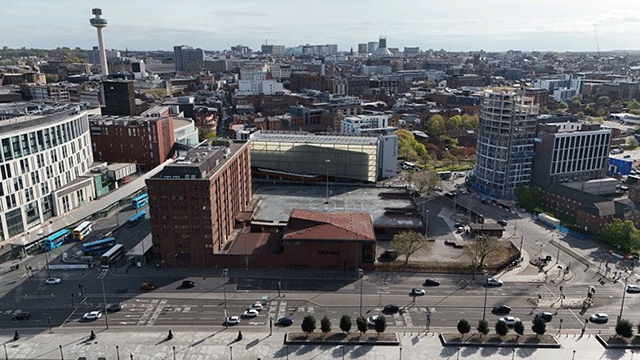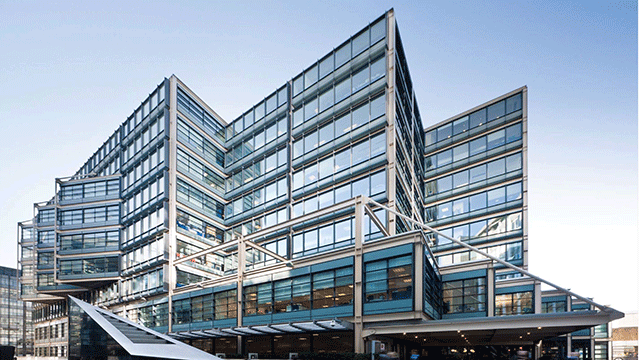Omers-owned Oxford Properties has made its first foray in European logistics after signing a deal with GLP to invest £200m in its Europe Development Partners I portfolio in exchange for a 20% stake in it.
GLP initially set up the development platform late last year after it acquired Gazeley, alongside an income portfolio seeded with Gazeley’s €1.7bn (£1.5bn) sq ft in the UK, Germany, France and the Netherlands.
Oxford Properties’ expansion into the European logistics market adds to its 13m sq ft logistics assets in the US. EG chats to its Europe boss Paul Brundage about why it seized the opportunity to debut in the European sheds sector.
How did the opportunity for the agreement arise?
“[As part of a wide-ranging Asia expansion strategy] we opened an office in Singapore in January. The first thing that came up in the process of us working through our strategy [for the continent] was the privatisation of GLP, which was listed on the Singapore stock exchange.
“Its shareholder, GIC (a Singaporean sovereign wealth fund), was really pushing for GLP to look at private alternatives, so we ended up getting a call through the broader Omers organisation as to whether we would be interested in doing it.
“It was obviously very early in our Asia strategy but we liked logistics a lot generally and we saw it as a great way to start into both Asia and into the logistics space.
“So we took a small position in the topco – 2% ownership – through a series of feeder fund vehicles and spent a lot of time getting to know the GLP team.
“We concluded in early January and I thought that on the back of that we would end up pursuing joint venture opportunities with GLP initially in Asia.
“We still intend to do that as part of our broader Asia strategy, but coincidentally it had just started into the process of buying Gazeley from Brookfield.”
Why has Oxford Properties chosen now to expand to logistics in Europe?
“The portfolio is heavily UK-weighted but it also has development opportunities in and around the broader Île-de-France area and throughout Germany off the back of our knowledge base in Berlin.
“In terms of our return requirements – and also market demand for new high-quality distribution warehousing space that is being fed off the disintermediation we are seeing through ecommerce of traditional retail – there were so many elements of this that made perfect sense for us.
“[Consequently] we have taken a 20% stake in the European development portfolio alongside some strategic partners that are both Canadian and Asian, as well as GLP.
“It is a way for us to grow the business globally and hopefully the next opportunity will be in Asia as initially planned, in that same space.
“That’s all on the back of us continuing to grow that business in the US and looking at how we can expand it beyond Canada as well.”
Is the investment centred on new developments or existing standing developments?
“It’s definitely about new developments. When GLP acquired the Gazeley portfolio, it had existing income-producing assets and development sites that were owned, controlled or optioned.
“We are an investor in the development platform – part of the Gazeley strategy is to use that scale and those relationships, to use GLP’s balance sheet but also bring in partners in order to grow the business and generate returns.
“Because of our return requirements, we chose to participate solely in the development venture and not in the income venture.
“But they have similarly established and capitalised the income portfolio – some of the same people in the development portfolio, some different. GLP is off and running in Europe.”
Why did Oxford Properties choose to enter the sector through this investment, rather than build its own platform?
“To be able to start with an investment of several hundred million [pounds] in something already established – the ability to grow to whatever size we feel is appropriate to grow – is a more practical way of going about it.
“On the other end of the spectrum, we weren’t comfortable buying Gazeley ourselves.
“That would have been a very significant cheque. You have to find a way between those extremes to enter the space.
“We are hopeful we can bring our expertise to the partnership. It’s about weighing the alternatives, looking at the macro and wanting to invest at scale.”
Logistics properties are being sold at record prices at the moment. Can it be argued that this has hit the market slightly too late?
“That’s a question we are asking ourselves about every asset class everywhere in the world at the moment.
“And it’s not just real estate – it applies to infrastructure, private equity, capital markets. At parent company level, we have a cost of capital of 7% – we have to find ways to invest in order to beat that liability.
“We liked the macro-story and growth prospects for logistics. We are concerned whether interest rates will translate directly into putting pressure on capital expenditure, so we are being quite thoughtful about not getting too long and deep at current asset pricing into new investments.
“For us, having a larger investable universe consisting of multiple asset classes, multiple geographies within regions and regions as a whole – from expanding in Asia, France, Germany and the UK to investing in logistics and in the build-to-rent sector.
“The more alternatives we have, the more we can turn these things on and off; from a public markets exercise we can trade them by the minute.
“We are fortunate we can look at broad markets. We don’t have an unlimited amount of capital but we also have a very significant cost per capital so we have to find ways to invest and yet still be focused so we are not all over the place. It’s not easy.”
Where are the key opportunities for Oxford Properties geographically?
“Ten years ago we were 100% Canada. Today we are just [over a] 50-50 split. We are on our way to reaching 30% business in Canada, 30% in the US, 30% in the UK and mainland Europe and 10% Asia – that is the current strategic plan.
“We have a limit to the number of places we are able to invest in and justify putting a team on the ground – we are not going to invest in places where we don’t have one on the ground.
“Our strategy, though, is really a city strategy – a 12 to 15-global city strategy that we are looking towards. There is a continued trend towards urbanisation. We have done an enormous amount of top-down, bottom-up research to select those cities and the three we selected for the UK and mainland Europe were London, Paris and Berlin.
“We have always been clear that we won’t invest in other offices in cities in the UK – it’s just not something we feel works for us. [However] when it comes to our BTR strategy, it will be London-focused but will include a small percentage of developments in other key UK cities.
“We are also willing to go outside of London per se in this particular venture, because there are millions of square feet of logistics [that can be purchased].
“They are located in other parts but ultimately they are set up [to] service the country, which is in turn driven by demand coming out of London, to a large extent.
“That golden triangle in the Midlands, where the Gazeley business was founded, is the central distribution hub for the entire country.
“The view is similar with Île-de-France and Berlin. We have a similar assessment with the US and are in the early stages of determining that [phase].”
Are you concerned about the potential impact of Brexit on the logistics sector, as well as other markets?
“I am very concerned about the impact on financial services and white collar employment in the City [office space]. We have rebalanced what we owned so that we are happy with what we have, but have not been looking to expand in that particular space.
“There are clearly concerns about what kind of supply chain movement will work across Europe in a post-Brexit world – [however] a lot of the demand is going to be for warehouse distribution to UK-specific consumers and businesses.
“I certainly hope Brexit doesn’t curtail pan-European supply chains but it’s a risk – we have done a lot of work thinking about it, but we were able to get comfortable at this scale of investment. Hopefully Brexit will not be a huge impact.”
To send feedback, e-mail pui-guan.man@egi.co.uk or tweet @PuiGuanM or @estatesgazette











